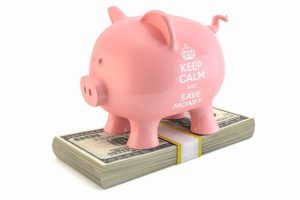
Disclosure: This post contains a referral link, which means I may receive compensation (at no extra cost to you) if you click through my referral link and sign up for an account. I only refer products or services that I trust and believe to add value to my life, and have confidence that they will add value to your life as well.
Have you always struggled with managing your money? Don’t know where to start to get things under control? Let’s get your money on track! Usually taking the first step is the most difficult!
Pick one or two of these easy action steps and get going!
Small steps add up to leaps and bounds over time, which is why it is so important to start and to be persistent!
Now, here they are. Read all of them but just pick the ONE or TWO most beneficial to you to start.
1. Track your expenses
If you have never tracked your expenses, start TODAY! This will be the most important money habit you ever learn. When you see where your money is going, you will have much more control over your financial future. Keep a DAILY list of any money spent, where it was spent, and what it was spent on. (Eating out, groceries, entertainment, clothing, etc.) And don’t forget online purchases! Those tend to be the ones we forget to write down and they are usually our larger purchases!

2. Organize your bills
Need one place to keep track of all your bills, due dates, and whether or not they’ve been paid? Grab the fun, yet amazingly functional Penny Steward Mama bill trackers here!
For a simple system to organize bill paying, print out a blank calendar, write when your bills are due and how much. Also, write when you get paid and how much. This will allow you to subtract your bills due from your income to see how much you have left for variable expenses.
Simple tip: As soon as you get paid, pay any bills that are due before the next paycheck. You will avoid late fees this way, and you will know how much discretionary income you have before next payday.
3. Start a savings account
To build up some cash savings, open a separate savings account specifically for emergencies. Begin automatically drafting a small amount from every paycheck into your savings account.
Simple tip: Save with purpose by deciding ahead of time what the money is being saved for. Emergency fund? Christmas? Birthday party savings? Cash to upgrade your vehicle? Always be sure to name that money!

4. Know what you owe and how much it’s costing you
When it comes to debts, it will be eye-opening to have them all listed on one sheet of paper. You need to know the total amount you owe, the minimum payment due each month, and the interest rate. You also should write what you’re paying every month and how much of that is going toward principal and how much toward interest. You will most likely be surprised at the money that is going toward interest!
5. Look at your net worth
Gaining a look at your net worth can be a huge motivator to change the bad habits and continue the good habits.
Want to make it easy and fun? Sign up for a FREE account at Personal Capital, link your accounts and watch Personal Capital do its magic! They have some really neat “accessories” on there as well, including budget and cash flow tracking and even a retirement planner! Seriously, it’s totally worth the few minutes it takes to sign up! It’s practically a financial advisor on a free platform!
6. Start with the budget
Create a household budget (or review your current budget/expenses very carefully). Are there any recurring expenses you may be able to lower? Are there any unnecessary expenses you may be able to cut out completely?
Need a walk-through on how to create your budget or some accountability in reviewing your current budget? Sign up for the next Penny Steward Mama Budget Challenge. This is a monthly challenge that takes place the last 5 days of every month.
Want to try a simple-to-use budget app? Dave Ramsey’s Every Dollar app will have your budget looking as cool as this pig in very little time! 
Every Dollar is free for the basic version and will help you set up your budget categories so you don’t forget about anything. If you want it to link to your bank accounts, there is a paid option for that too.
7. Utilize cash envelopes
Is card swiping getting you into trouble? Switch to using only cash envelopes for variable expenses. These would include groceries, eating out, clothing, fun money, entertainment, etc. Decide ahead of time how much money should be allotted to each expense category. Go to the bank and get just the right amount of cash for each envelope. Once the money in that envelope is spent, you have no more until the next paycheck! And then you divvy up the cash again! This is definitely the best way to TRULY pay attention to where your money is going and to help you stay on track with your budget at all times!
8. Pay extra on your debt
Pay extra on the principal of a debt payment (instead of just the minimum payment.) You could pay extra on a credit card, car loan, or even your mortgage!!

Which of these items do you plan to start?
If you need help getting started, or if you have your own action step, please comment below! I’d love to hear what your plan is to get on track with your finances!
We all would love to be completely in control of our finances, but we don’t always follow through with our intentions.
Tim Fargo said, “Good intentions might sound nice, but it’s positive actions that matter.”
Start with your positive action NOW and begin working toward your financial dreams!
As always, steward intentionally.
Heather
P.S. Please LIKE the Penny Steward Mama Facebook fan page for daily discussion. Also, to gain encouragement in achieving your life aspirations, join the Accountability | Penny Steward Mama page.


This is a wonderful post! We have a budget but the cash envelope is a great idea we will try!